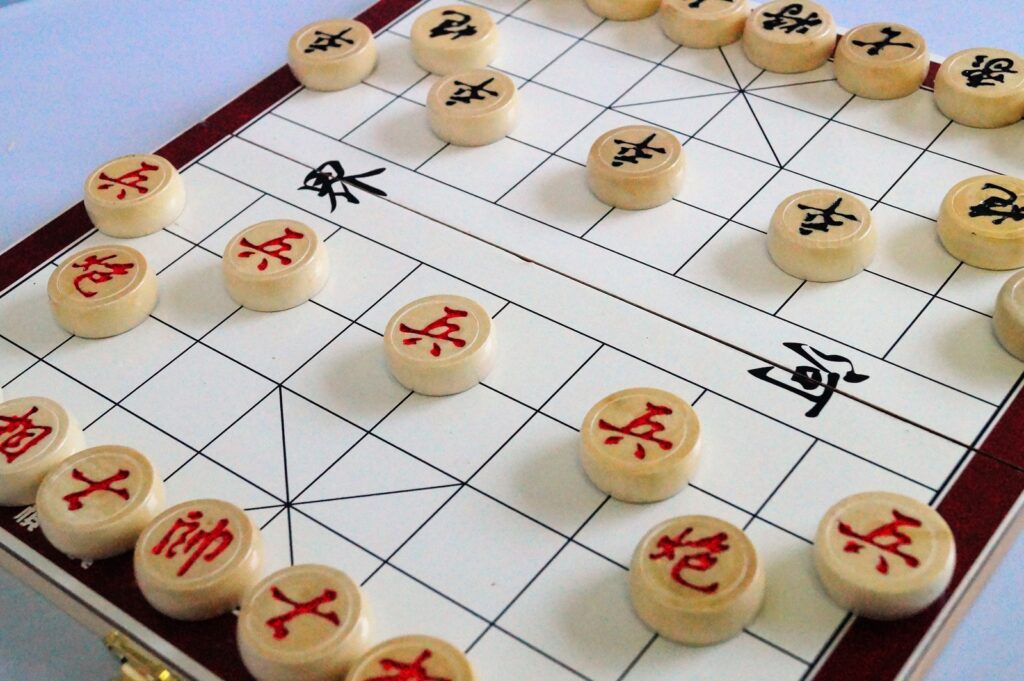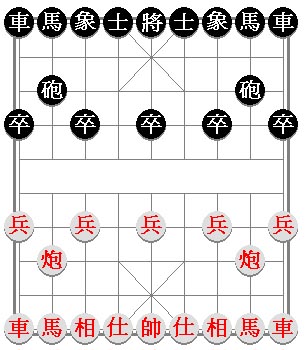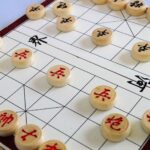
Xiangqi 象棋 also called Chinesechess or Elephant chess, is a strategy board game for two players. It is one of the most popular board games in China and is in the same family of games as Western chess, chaturanga, shogi, Indian chess, and janggi. Besides China and areas with significant ethnic Chinese communities, xiangqi is also a popular pastime in Vietnam, where it is known as cờ tướng, literally ‘general chess’. (Source from Wikipedia)
chinese chess (ad 700)
Chinese chess history: Chinese chess is a strategy board game that has been played in China ever since 700 AD. Just like orthodox chess, the Chinese believe that it was derived from the popular Indian game known as chaturanga, a 4-player game played with dice.

The game represents a battle between two armies, with the primary object being to checkmate the enemy’s general (king). Distinctive features of xiangqi include the cannon (pao), which must jump to capture; a rule prohibiting the generals from facing each other directly; areas on the board called the river and palace, which restrict the movement of some pieces but enhance that of others; and the placement of the pieces on the intersections of the board lines, rather than within the squares.
Xiangqi is played on a board nine lines wide and ten lines long. As in the game, the pieces are placed on the intersections, which are known as points. The vertical lines are known as files, and the horizontal lines are known as ranks.
Centred at the first to third and eighth to tenth ranks of the board are two zones, each three points by three points, demarcated by two diagonal lines connecting opposite corners and intersecting at the centre point. Each of these areas is known as, a castle.
Dividing the two opposing sides, between the fifth and sixth ranks, is the “river”. The river is often marked with the phrases 楚河 meaning “River of the Chu “, and 漢界 meaning “Border of the Han”, a reference to the Chu–Han War. Although the river provides a visual division between the two sides, only two pieces are affected by its presence: soldiers have an enhanced move after crossing the river, and elephants cannot cross it. The starting points of the soldiers and cannons are usually, but not always, marked with small cross

Each player in turn moves one piece from the point it occupies, to another point. Pieces are generally not permitted to move through points occupied by other pieces, the exception being the cannon’s capturing move. A piece can be moved onto a point occupied by an enemy piece, in which case the enemy piece is captured and removed from the board. A player cannot capture one of their own pieces. Pieces are never promoted (converted into other pieces), although the soldier gains the ability to move sideways after it crosses the river. Almost all pieces capture using their normal moves, while the cannon has a special capture move described below. An instance of checkmate that assumes the cannon is safe and Black cannot block the check. The horse is not needed for this checkmate. The game ends when one player checkmates the other’s general.
chinese chess in 80"

The Chinese chess game is ultimately known as the Elephant Game (Xiangqi), where Xiang means elephant and Qi means chess game.
There are two reasons why it is called the elephant game. The first reason is that the game pieces of pawns and generals in Liubo were made of ivory, and ivory comes from elephants. The second reason was that the Chinese incorporate elephants in their military, which informed how the pieces were arranged in the game.
Aside from that, the Chinese chess game also holds cultural significance among the Chinese people. Because of this, it has become a popular means of intelligent entertainment in the whole of China and Vietnam. Almost everyone in China knows how to play Chinese chess, particularly as a way of associating with one another or a way of passing time.


The Chinese chess game is ultimately known as the Elephant Game (Xiangqi), where Xiang means elephant and Qi means chess game.
There are two reasons why it is called the elephant game. The first reason is that the game pieces of pawns and generals in Liubo were made of ivory, and ivory comes from elephants. The second reason was that the Chinese incorporate elephants in their military, which informed how the pieces were arranged in the game.
Aside from that, the Chinese chess game also holds cultural significance among the Chinese people. Because of this, it has become a popular means of intelligent entertainment in the whole of China and Vietnam. Almost everyone in China knows how to play Chinese chess, particularly as a way of associating with one another or a way of passing time.
chinese chess collectible sets














